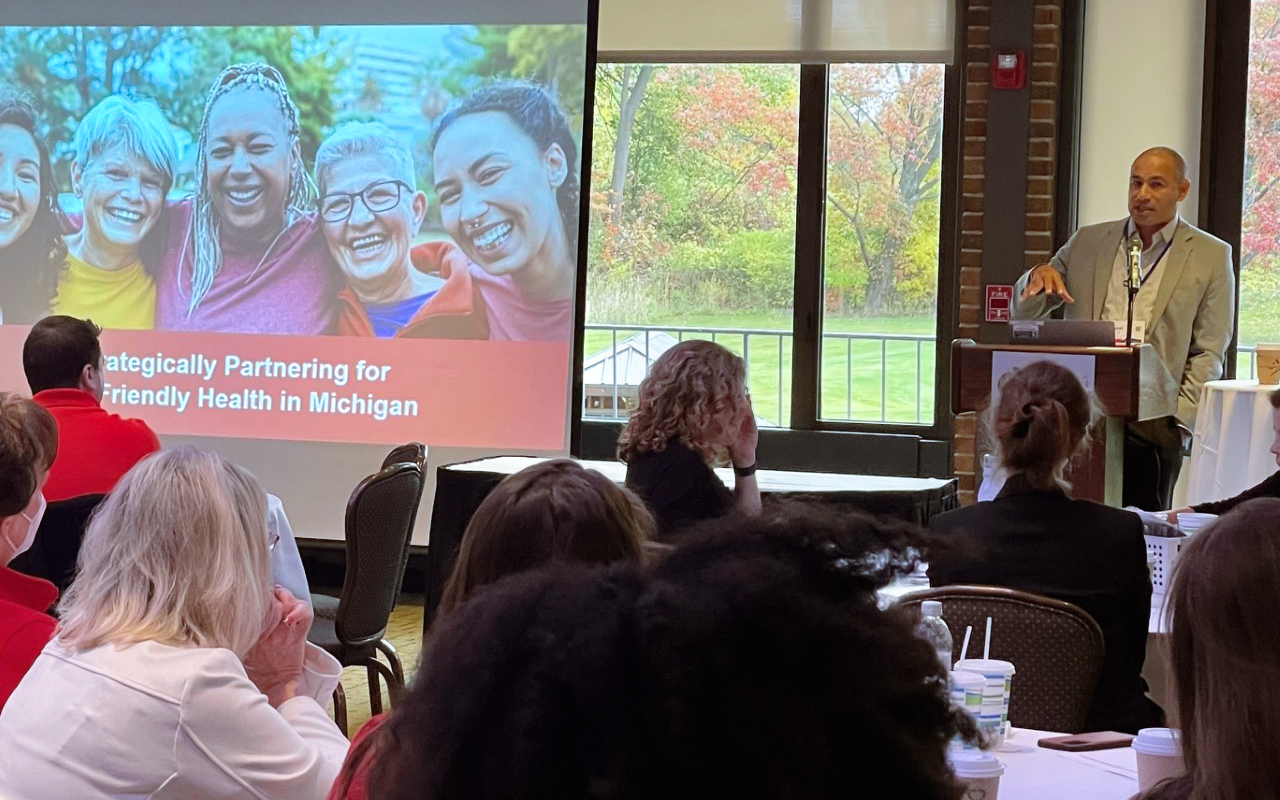
Ten years ago, or even five, a conference on age-friendly health might have looked quite different. Michigan health leaders have moved from idea-sharing and proof-of-concept pilot programs to a more ambitious, actionable stage—scaling age-friendly practices across sectors to build an interconnected system of care.
That’s the vision that spurred the Strategically Partnering for Age-Friendly Health in Michigan Conference, the first of its kind in the state. More than 120 aging leaders and innovators gathered for the event, which was held on October 12 at Michigan State University, a certified age-friendly university.
“There’s a strong appetite for alignment and collaboration in Michigan’s aging field right now,” said Kari Sederburg, director of the Health Fund’s Healthy Aging Initiative. “The conference reflected and built on that excitement—we’re all working together toward a Michigan that responds to older adults’ needs and empowers them to live happy, healthy lives.”
The Health Fund hosted the one-day conference along with Trust for America’s Health and the Michigan Public Health Institute. Speakers echoed a common refrain: age-friendly work is for everyone. For example, information sharing across care delivery systems, such as between hospitals and home care, is critical for older adults’ health outcomes, but the same technology can benefit patients of all ages. Or, consider how social isolation, changed mentation, or medication side effects can be seen as par for the course for older patients but unacceptable for other ages. Healthy aging is fundamentally a public health concern, and the entire system benefits from efficient and protective care for older adults.
Beyond specific practices, speakers highlighted the ways Michigan can expand implementation of age-friendly work, not just through time-restricted programs and workforce expansion, but by injecting the principles into the entire ecosystem, making them a part of the ethos of care delivery. Advocates stress that we must not only promote age-friendly practices, but also dismantle the ageism in the ways we think and speak.
Keynote speaker Dr. Aaron Guest, a national leader in aging and health care, spoke on the connections between social determinants of health and healthy aging, which is also the subject of his book, Healthy Aging Through the Social Determinants of Health. His framework encapsulated the new, broader view of age-friendly work, making the case for the upstream context behind health outcomes. An elderly person falling, for example, has any number of “midstream” predictors: access to health care, building design, lack of exercise, mental health, or excess alcohol. Further upstream, you can find predictors of those factors: education, housing, social life, place of birth, or employment. Building an age-friendly environment requires an understanding and response to the social contexts in play.
Structural racism and health disparities are among the most damaging of those contexts—AARP Michigan has shared, for example, that Black older adults in Michigan have lower rates of health insurance coverage, greater rates of diabetes and high blood pressure, and less follow-up medical care than their white counterparts, among other disparities. Detroit Area Agency on Aging’s Dying Before Their Time study found that the death rate for Detroit adults in their 50s was 122% higher in Detroit compared to the rest of Michigan and that social determinants of health are largely to blame. Dr. Guest’s comments emphasized the need for age-friendly practices to be equitable and culturally responsive, as too often services and supports miss significant portions of older adults and their caregivers.
The conference’s stated goal was to “chart the course” for an age-friendly future, and the ship is already on its journey. The Health Fund has supported various age-friendly projects in Michigan, including ones that are part of the Age-Friendly Health Systems and Age-Friendly Public Health Systems national initiatives. COVID-19 disrupted much of the work in this area, as it did across so many fields, but it also heightened the urgency in productive ways. Michigan’s growing aging population adds to that urgency—the services we build and strengthen now will be critical to support the coming wave of older adults.
Conferences like this one are a reminder of how far Michigan has come in constructing an age-friendly ecosystem, as well as how much more we’d still like to do. Aging advocates are asking for more than a metric to assess, a lens to apply, a concept to discuss. When we say “age-friendly,” we’re talking about a core value, a principle so consistently applied that it becomes part of the lifeblood of the health ecosystem. Not a feature, but a condition.
We’ll keep working until we get there.
